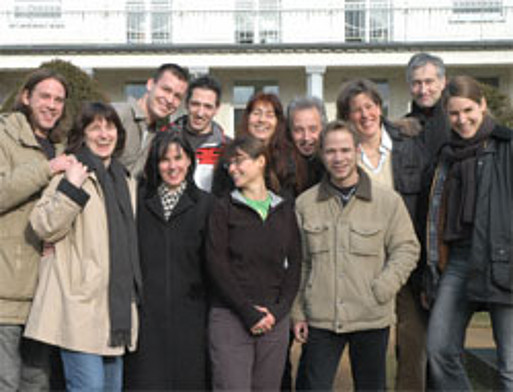Research Team Dr. Jonuleit

Head:
Team:
Dr. Andrea Tüttenberg, wissenschaftliche AssistentinDr. Jan Kubach, Postdoc
Anita Correll, Doktorandin
Bettina Trinschek, Doktorandin
Mohamed Hossam El-Din, Doktorand
Mario Hubo, Doktorand
Andreas Sommer, Doktorand
Ayten Balli, MTA
Lydia Paragnik, MTA
SFB-432: "Mechanisms of tumor defense and their therapeutic implications", Subproject B11: "Analysis and modulation of immune suppression by regulatory T cells and dendritic cells in melanoma patients"
Dendritic cells (DC) are specialized for the initiation of T cell immunity, including cytotoxic T cells (CTL), which kill virus infected as well as malignant cells. In mouse models, immunization with antigen pulsed or transfected DC efficiently primes CD4+ and CD8+ T cells, resulting in protective immunity against infectious agents and tumors. Because of their unique properties as professional antigen-presenting cells to induce protective immune responses, several strategies using tumor antigen-loaded DC as “natural adjuvants†for immunotherapy of cancer patients were developed. Numerous preclinical and clinical studies using in vitro-generated monocyte-derived DC in combination with tumor-associated antigens for the treatment of patients with advanced (stage IV) melanoma were implemented. However, in most cases the immune system of advanced stage IV cancer patients allows only a transient anti-tumor response. Moreover, increasing evidence exists that active suppression by anergic conventional T cells, tumorantigen-specific Tregs and tolerogenic DC ultimately prevent "autoaggressive" immune reactions against the tumor.The abrogation of the suppressive influence of Tregs on anti-tumor immune responses is certainly of vital importance for future anti-cancer vaccine strategies. Aims of this project are the functional characterization of CD25+ Tregs in melanoma patients in different stages of disease and to design protocols for transient manipulation of these suppressors. Additionally, we will develop novel protocols for generation of "conditioned" DC for an efficient DC-based immunotherapy of melanoma patients. Conditioning of mature DC by certain signals, such as TLR ligands, should allow these DC to overcome suppressive Treg-activity for tumor antigens. Thereby, self-tolerance might be broken and effective anti-tumor T cell responses should be induced.
A better understanding of interactions between DC, different members of the Treg family and other cells of the immune system will lead to improved protocols for clinical use of defined DC for the induction of efficient immune responses against cancer.

